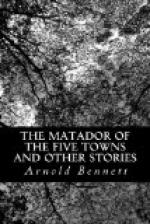Of course no one in the house believed in fortune-telling. Oh no! But as an amusement it was amusing. As fun, it was fun. She did her business with tea-leaves: so the tale ran. This was not considered to be very distinguished. A crystal, or even cards, or the anatomy of a sacrificed fowl, would have been better than tea-leaves; tea-leaves were decidedly lower class. And yet, despite these drawbacks, when the question arose who should first visit the witch of Endor, there was a certain hesitation.
“You go!”
“No, you go.”
“Oh! I’m not going,” (a superior laugh), etc.
At last it was decided that Jack Hall and Cissy Woodruff (Charlie’s much younger sister), the pair having been engaged to be married for exactly three days, should make the first call. They ascended, blushing and brave. In a moment Jack Hall descended alone, nervously playing with the silk handkerchief that was lodged in his beautiful white waistcoat. The witch of Endor had informed him that she never received the two sexes together, and had expelled him. This incident greatly enhanced the witch’s reputation. Then Stephen happened to mention that he had heard that the woman’s mother, and her grandmother before her, had been fortune-tellers. Somehow that statement seemed to strike everybody full in the face; it set a seal on the authority of the witch, made her genuine. And an uncanny feeling seemed to spread through the house as the house waited for Cissy to reappear.
“She’s very good,” said Cissy, on emerging. “She told me all sorts of things.”
A group formed at the foot of the stairs.
“What did she tell you?”
“Well, she said I must expect a very important letter in a few days, and much would depend on it, and next year there will be a big removal, and a large lumbering piece of furniture, and I shall go a journey over water. It’s quite right, you know. I suppose the letter’s from grandma; I hope it is, anyway. And if we go to France—”




